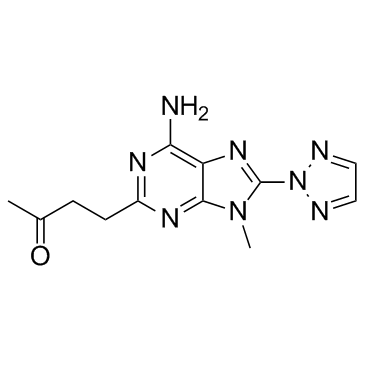| Description |
ST4206 is a potent adenosine A2A antagonist, with Kis of 12 nM and 197 nM for adenosine A2A receptor and adenosine A1 receptor, respectively.
|
| Related Catalog |
|
| Target |
Ki: 12 nM (adenosine A2A receptor), 197 nM (adenosine A1 receptor)[1]
|
| In Vitro |
ST4206 inhibits agonist-induced cAMP accumulation with an IC50 of 990 nM[1].
|
| In Vivo |
ST4206 (10, 20, and 40 mg/kg, p.o.) antagonizes haloperidol-induced catalepsy, and increases motor activity in a dose dependent manner in mice. ST4206 (20 and 40 mg/kg) significantly increases the number of contralateral turns induced by l-DOPA in rats[1]. ST4206 is orally active at concentrations of 10, 20, and 40 mg/kg in haloperidol-induced catalepsy in mice[2].
|
| Animal Admin |
Mice[1] Catalepsy is induced by haloperidol (2 mg/kg) injected intraperitoneally (i.p.) 2.5 h before oral administration of 10, 20, and 40 mg/kg ST1535, ST3932, ST4206 or vehicle. An additional group without haloperidol (control group) with only vehicle is administered. At time 0 min, successful induction of catalepsy in all animals is checked before compounds administration, then, catalepsy is scored every 60 min for 3 h. Each mouse is gently placed by its forepaws on a wire at a height of 4.5 cm. The catalepsy is measured as the time necessary for the animal to step down with at least one forepaw with a cut off time for each animal of 60 s; after this time the mouse is gently removed from the wire. Catalepsy is recorded using a video-camera and by an observer who is unaware of the treatment. Rats[1] Two weeks after the unilateral 6-OHDA-lesion, rats are screened on the basis of their contralateral rotation in response to l-DOPA (50 mg/kg i.p.)+benserazide (30 mg/kg i.p.). Rats not showing at least 200 contralateral rotations during 3 h testing period are eliminated from the study. One week later, rats are administered with the threshold dose of l-DOPA (3 mg/kg i.p.)+benserazide (6 mg/kg i.p.) in combination with vehicle (10% sucrose and 0.3% Tween 80 in sterile water i.p.) or with ST1535, ST3932 and ST4206 respectively (10, 20 and 40 mg/kg i.p.). l-DOPA is administered 5 min after vehicle or molecules in study, whereas benserazide is administered 30 min before l-DOPA injection. Contralateral rotations are measured every 10 min for 2 h by Rotameter system.
|
| References |
[1]. Stasi MA, et al. Animal models of Parkinson׳s disease: Effects of two adenosine A2A receptor antagonists ST4206 and ST3932, metabolites of 2-n-Butyl-9-methyl-8-[1,2,3]triazol-2-yl-9H-purin-6-ylamine (ST1535). [2]. de Lera Ruiz M, et al. Adenosine A2A receptor as a drug discovery target. J Med Chem. 2014 May 8;57(9):3623-50.
|
